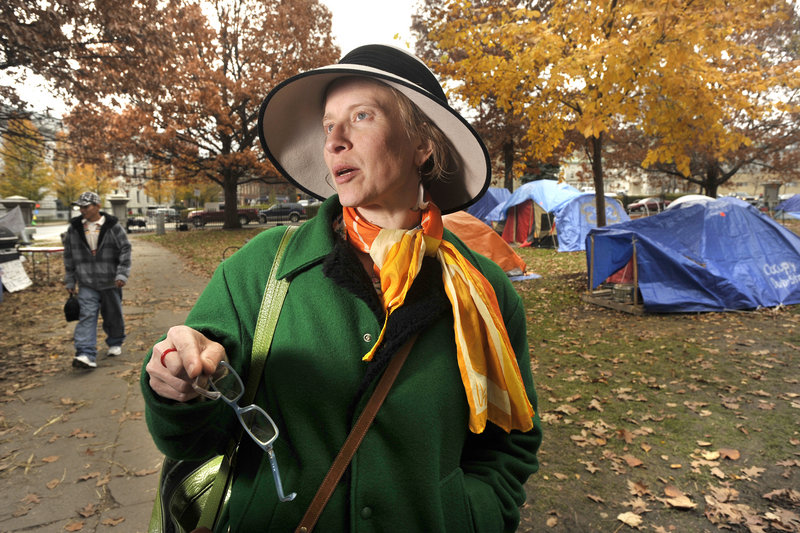PORTLAND – City officials inspecting Occupy Maine’s Lincoln Park encampment Thursday found some health and safety issues that must be addressed if the protesters want to continue camping there, officials said.
Members of the fire, police, inspections, parks and public services departments walked through the park with a small group of protesters, looking for possible hazards or threats to public property. A list of issues they found will be forwarded to the group in the next two or three days, said city spokeswoman Nicole Clegg. She declined to provide examples of what items need to be addressed.
The protesters didn’t get any immediate feedback either.
“It was a good walk-through,” said protester Alan Porter, who has been active in the maintenance work at the camp. “We couldn’t get any immediate response, which was OK. We’ll be on pins and needles waiting for the response.”
Also Thursday, Occupy Bangor protesters met with city officials who had decided the group must leave a city park. The two sides reached a tentative agreement allowing protesters to continue to occupy the park during regular hours, from 6 a.m. to 10 p.m., but they must remove two big tents used for storage and not have structures up overnight. They also must file an application for an event permit with the city by the close of business today.
The Bangor conflict came amid reports of a crackdown on Occupy sites nationwide and violent clashes with police and mass arrests at some Occupy sites.
On Thursday, protesters across the U.S. clogged streets and tied up traffic in demonstrations to mark two months since the movement’s birth and signal they aren’t ready to quit, despite the breakup of many of their encampments by police. Hundreds of people were arrested, most of them in New York City.
The demonstrations — which took place in cities such as Los Angeles, Las Vegas, Boston, Washington and Portland, Ore. — were for the most part peaceful.
In Portland, about 50 Occupy protesters gathered in Monument Square, then marched to the Merrill Lynch offices on Fore Street. Initially they entered the lobby and were shouting slogans and banging a drum, police said.
The company called police, who moved the protesters out to the sidewalk. When merchants complained about the noise of the drum, police ordered the drumming to stop.
The group then marched to TD Bank on Union Street and on to Bank of America at One City Center before ending up back in Monument Square. No one was arrested.
Some members of the public have criticized the city’s decision to allow the protesters to stay in Lincoln Park in violation of city ordinances that forbid overnight camping.
The group also has been the target of vocal criticism, with some observers saying protesters are just lazy and don’t want to work, and that the encampment has become a haven for the city’s homeless, some of whom are mentally ill.
Protesters say the park has about 75 campers — the number fluctuates — sleeping in about 50 tents. They are open to anyone who wants to join them, and do not pick and choose who can be part of the movement.
The mechanism by which the group resolves interpersonal issues is a lengthy one that seeks consensus but requires patience and tolerance. Some observers with experience in counseling commended several of the protesters for how they have handled challenging individuals and disruptive behavior.
“This is a model community that has been developed for the public’s benefit to remind each other and the public at large what a community based on democracy and concern for one another can look like,” said John Branson, an attorney representing the protesters.
The group is mobilized around a distrust of an economic system that gives the richest 1 percent control over the fate of others, he said.
“The Occupy encampment is the only place where there is no distinction between the homeless and those who have a home,” he said. “The homeless are not segregated or labeled or isolated as they are by society at large not treated like vagrants or bums, but treated like human beings, which they are.”
Some of the chronically homeless are experienced at living outdoors and are passing on pointers, just as others in the movement are teaching them about political expression, he said.
The Associated Press contributed to this report.
Staff Writer David Hench can be contacted at 791-6327 or at:
dhench@pressherald.com
Send questions/comments to the editors.



Success. Please wait for the page to reload. If the page does not reload within 5 seconds, please refresh the page.
Enter your email and password to access comments.
Hi, to comment on stories you must . This profile is in addition to your subscription and website login.
Already have a commenting profile? .
Invalid username/password.
Please check your email to confirm and complete your registration.
Only subscribers are eligible to post comments. Please subscribe or login first for digital access. Here’s why.
Use the form below to reset your password. When you've submitted your account email, we will send an email with a reset code.